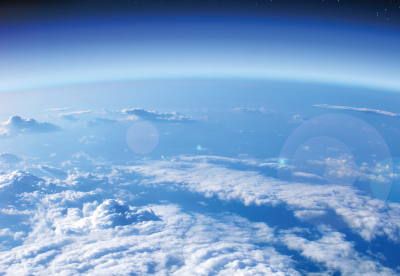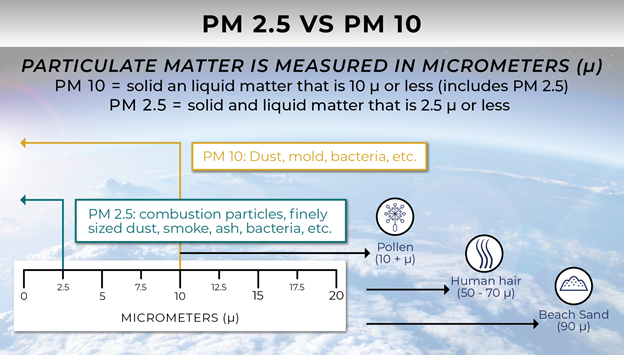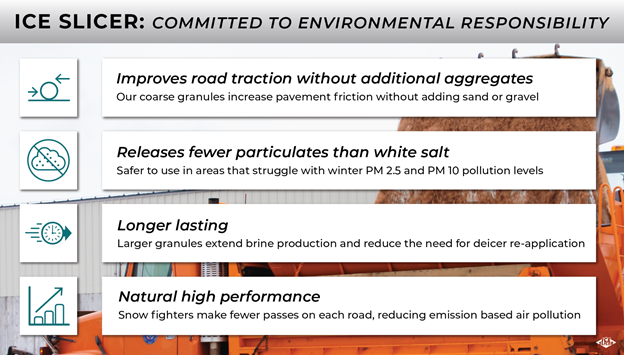Why does air pollution get worse during the winter time? You may remember from school scientific experiments, that cold air sinks and warm air rises. Cold air is more dense and moves more slowly than warm air. Sinking cold air can create an atmospheric cap over the earth’s surface, while warm air passes over the top. This cap prevents pollution from dissipating, and creates unhealthy conditions for anyone within it.
Let’s take a closer look at 2 types of air pollution that worsen during the winter months, and how we can increase our environmental responsibility.

What is Particulate Matter?
Air pollution can occur as a gas, liquid, or solid. Measuring and reducing each type of pollution requires a different approach. Particulate matter (PM) refers to microscopic solid or liquid particles in the air. That means, PM pollution doesn’t include gases like carbon dioxide (CO2) and nitrogen dioxide (NO2). PM particles are very small and measured in micrometers (µ).
What Causes PM Air Pollution?
Particulate matter enters the air from many different sources, some are natural, and others are man-made. Natural PM sources include dust, sand, and pollen blown from the wind. Wildfires (natural and human caused) also release particulate matter into the air. Other man-made sources include coal or wood burning furnaces (in homes or factories), vehicles with internal combustion engines, and over-use of dusty aggregates on the roads.
PM 2.5 VS PM
Environmental scientists group particulate matter into 2 categories: PM 2.5 and PM 10. PM 2.5 includes particulate matter that measures 2.5 micrometers and below. PM 10 includes particulate matter that measures 10 micrometers and below (that means PM 10 includes PM 2.5).

All particulate matter adversely impacts Earth’s climate and our health in different ways. However, scientists have found that PM 2.5 is the category of biggest concern. According to the Health Effects Institute, PM 2.5 is the 6th highest risk factor for early death worldwide and causes chronic respiratory disease, heart disease, and cancer. These particles are small enough that when they are directly inhaled, can enter into our bloodstream, and cause harmful inflammation in our respiratory and circulatory systems.
What Can We All Do to Help?
There are a few steps all of us can take to help reduce PM pollution during the winter time:
- Be Informed (stay current on pollution concerns in your city and state, follow local environmental guidelines that encourage changes during the winter)
- Drive More Responsibly (carpool when possible, and plan your excursions/errands wisely to reduce your drive time)
- Convert to cleaner fuels (look into switching from burning coal or wood to clean burning fuels such as natural gas and propane)
- Use soluble granular deicers (they do not require additional dusty aggregates that release PM into the air)
EnviroTech’s Commitment to Environmental Responsibility
EnviroTech is proud to offer environmentally responsible deicing solutions, like Ice Slicer®, for areas that struggle with both PM 10 and PM 2.5 pollution. In fact, switching from dusty road aggregates to Ice Slicer® helped Utah meet a clean air milestone!

This environmentally friendly deicer contains fewer particulates than white road salt, and eliminates the need to apply dusty aggregates to the road. Its ideal blend of granule sizes provide stabilizing traction on paved surfaces without adding sand and gravel that increase PM pollution.
Independent lab and field tests show that Ice Slicer® also significantly out-performs white salt at all temperatures. Its naturally high performance means snow fighters take fewer passes at each road, reducing emission pollution. In addition, when new snowfall hits, Ice Slicer® treated roads stay clearer and safer for longer than other deicing products, reducing the need for more deicing applications.

